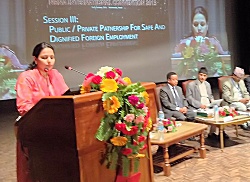Remarks by Gitanjali Singh, Deputy Representative, UN Women Nepal at the launch of Situation Report “Nepali Women in the Middle East”
NRN Global Conference, Session III: Public/Private Partnership for Safe and Dignified Foreign EmploymentDate:
 Chief Secretary Mr. Poudyal, Secretary Mr. Shrestha, NRNA Chairperson, Mr. Karki, Chair Task Force on Foreign Employment of NRNA, distinguished guests on the dais, NRN delegates, ladies and gentlemen, Good Evening and Namaste,
Chief Secretary Mr. Poudyal, Secretary Mr. Shrestha, NRNA Chairperson, Mr. Karki, Chair Task Force on Foreign Employment of NRNA, distinguished guests on the dais, NRN delegates, ladies and gentlemen, Good Evening and Namaste,
On behalf of UN Women, I would like to congratulate the Non-Resident Nepali Association (NRNA) for organizing the 6th Global Conference. NRNA’s efforts have been exemplary in unifying Nepalese residing all over the world and mobilizing their knowledge, skills, and expertise for the overall development of the country.
The UN Women Country Office is pleased to partner with the NRNA under the leadership of the Government of Nepal to address the critical issue of women migrant workers (WMW) rights, voice and agency.
Women’s participation in the labour force varies around the world, but nowhere has it reached parity with men. For many, decent work is a distant dream, since they are marginalized in poorly paid, poorly protected jobs. Around the world, a record number of women are now migrating to seek work and better lives. For many, migration yields these benefits; for others, it carries dangerous risks, such as exploitation in domestic jobs, and vulnerability to violence. Migration policies and practices have been slow to recognize these risks and take steps to make the process safe for women.[1]
In Nepal, UN Women has offered long standing support to women’s safe migration. A decade of effort by UN Women and our partners has helped visibilize the issues of migrant workers and has contributed to ensuring due recognition and protection for the rights of WMWs in legal frameworks and key policy documents. As part of our continued advocacy and to ensure that policies are informed by facts, UN Women and the European Union supported the study “Nepali Women in the Middle East: A Situation Report”, in partnership with NRNA and the Nepal Institute of Development Studies (NIDS). The study looks at the situation of Nepali women in 4 countries - Saudi Arabia, United Arab Emirates, Kuwait and Lebanon.
We would like to acknowledge the instrumental role played by Dr. Ganesh Gurung and NRNA in this research. The study emphasizes the need for constructive and continued involvement of NRNA in addressing and protecting the rights of WMWs in destination countries. NRNA can be the first point of contact for women migrant workers.
Given the transnational dynamics of international migration, no country can manage it alone. There is growing recognition of the need for cooperation between Governments and various actors at all levels to develop a comprehensive framework for migration governance. NRNA with its networks in 65 countries can be a critical player in influencing this global migration governance framework and play a significant role in promoting and advocating for the rights of women migrant workers. NRNA’s contribution and collaboration is essential.
This conference is an important platform to address the rights of migrant workers. As the UN Secretary General recently stated at the High Level Dialogue on Migration and Development “Migration is an expression of the human aspiration for dignity, safety and a better future. It is part of the social fabric, part of our very make-up as a human family……It is our collective responsibility to make migration work for the benefit of migrants and countries alike”.
Migration is a choice. We owe it women to make it safe. UN Women is an active advocate of safe migration for women. We look forward to working closely with all of you to promote and protect the rights of women migrant workers.
Thank you.
[1] https://www.unwomen.org/en/what-we-do/economic-empowerment